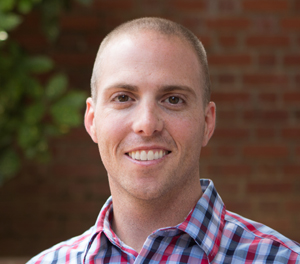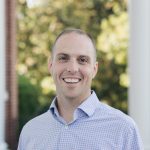What does it mean to connect faith with everything you do? According to Benjamin Quinn, it means that you love God and love neighbor — no matter where you are, and no matter where your paycheck comes from.
Quinn recently discussed this topic — and his book Every Waking Hour — with Jim and Martha Brangenberg on iWork4Him radio. You can listen to the full interview above. Here are a few excerpts (edited for clarity):
How is Southeastern Seminary equipping students to connect faith and work?
 Our President, Dr. Danny Akin, has branded our seminary for the entire time he’s been here as ‘a Great Commission College and Seminary.’ A lot of it has to do with how we understand the Great Commission. The mission of Southeastern is to glorify the Lord Jesus Christ by equipping students to serve the Church and fulfill the Great Commission. If we limit the Great Commission simply to training pastors and missionaries for evangelism, then I think we’re missing it. To be very clear, it’s not less than that. And it is the responsibility of the college and the seminary to train pastors and missionaries as best we can, and evangelism are absolutely critical. I’m not diminishing that in any way. But at the same time, we’re broader than that as well.
Our President, Dr. Danny Akin, has branded our seminary for the entire time he’s been here as ‘a Great Commission College and Seminary.’ A lot of it has to do with how we understand the Great Commission. The mission of Southeastern is to glorify the Lord Jesus Christ by equipping students to serve the Church and fulfill the Great Commission. If we limit the Great Commission simply to training pastors and missionaries for evangelism, then I think we’re missing it. To be very clear, it’s not less than that. And it is the responsibility of the college and the seminary to train pastors and missionaries as best we can, and evangelism are absolutely critical. I’m not diminishing that in any way. But at the same time, we’re broader than that as well.
Even in the Great Commission itself, Matthew 28, Jesus says, “teaching them to obey everything I have commanded you.” What are the commands of Christ? There’s nothing greater than the command to love God and other people. And there’s nothing about that Greatest Command that’s limited to pastors and missionaries. So if we take the Great Commission seriously, we’re talking about all Christians, and we’re talking about everything that they do in all times and all spaces, not just pastors and missionaries in pioneering contexts, although that’s important as well.
Why did you and Walter Strickland address faith and work and write Every Waking Hour?
In terms of the motivation behind it, it came first and foremost from our provost at Southeastern. Bruce Ashford was in conversation with the Kern Family Foundation, who’s put a lot of money in and invested a lot all the way around for the purpose of stirring this conversation about the intersection of faith, work and economics as a whole.
We were already hearing from students, especially on the mission field, “How do we think better about ‘platform’? When we talk about going to a closed country or a high security country for platform, I feel like I’m being somewhat disingenuous in saying that I’m here under the auspice of being a business person but I’m really here to share the gospel. I feel like there’s a disconnect. Does it have to be that way?”
At the same time, we were in conversations with the Kern Foundation about receiving a grant to help stir up this conversation at Southeastern and help to bring clarity about that. It began with a better theory about how Christians engage culture broadly. And then it began to narrow down specifically. How especially do we understand vocation and calling broadly, and more specifically how do we understand our own tactile, everyday 9-5 or 5-9 responsibilities for our work? So we began to dial down on that. We taught a class, which you can actually take for free online at Southeastern, and then a book came alongside after that.
On the significance of the Great Commandment (Matthew 22:36-40)
We love God first in this vertical sense. By loving God properly, we love the world in the same way he does. We don’t love the world in the way 1 John warns us against — that we fall in love with the ways of the world. But instead, that because of our love for God — this same God who so loved the world that he sent Christ for that world — we too turn around and face this world in a proper sense with a spirit-filled motivation about us. We then go about living horizontally in that way as well. We are living in this cruciform, cross-shaped Christian living. We love God first, but then we also must love other people. And it’s not vertical versus horizontal, it’s vertical and horizontal. We have to keep both of them. If you lop either side of that off, you’re wrong. We cannot hit the bullseye of loving God and loving other people if we lop one off. We have to keep them in balance, and keep them in order.
If it’s true that’s the most important thing about living in God’s world, then it doesn’t matter where your paycheck comes from. If it’s true that the most important thing is loving God and loving other people, then insofar as you have any kind of relationship with other people at your work, then your ministry is operative and it’s activated right there. So whether your paycheck comes from a church, a 501(c)(3), or a missions organization or a seminary, it really doesn’t matter where your paycheck comes from. The point is you have an opportunity to maximize the relationships God has given you in such a way that because you first love him, now you have the chance to love other people.





No comments have been added.